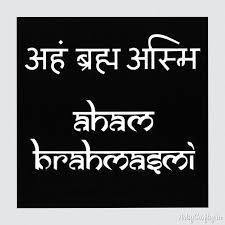Eminence of the passages 'Tattvamasi' and 'Aham Brahmasmi' in Advaita
10 views
Skip to first unread message
V Subrahmanian
Jul 1, 2022, 7:39:38 AM7/1/22
to Advaitin
Tattvamasi (Chhandogya) and Aham Brahmasmi (Brhadaranyaka) are of the Upanishads. These verses teach the unity of Jiva-Brahman. The occurrence of these passages is very extensive in Advaita Darshana. So much so that these verses have a worldwide reputation as representatives of Advaita philosophy.
These two sentences are quoted many times in Shankara's Prasthanatraya Bhashya. Tattvamasi is quoted verbatim in the Bhashya more than a hundred times. And many times this sentence is paraphrased. Aham Brahmasmi is mentioned more than thirty times verbally and many times paraphrased.
The occurrence of these two sentences is numerous in the prakarana texts of Shankara and in the commentaries of others on these and in the Advaita works of others.
Example of the verbatim quote:
न हि जीवो नामात्यन्तभिन्नो ब्रह्मणः, ‘तत्त्वमसि’ ‘अहं ब्रह्मास्मि’ इत्यादिश्रुतिभ्यः । Brahmasutra Commentary 1.1.31.
[The Jeeva is not any different from Bramhan as taught in the passages tattvamasi and aham brahma asmi.]
Examples of citing implicitly:
1. यदा तु देहेन्द्रियमनोबुद्धिसङ्घाताद्व्युत्थाप्य श्रुत्या प्रतिबोध्यते नासि त्वं देहेन्द्रियमनोबुद्धिसङ्घातः, नासि संसारी — किं तर्हि ? — तद्यत्सत्यं स आत्मा चैतन्यमात्रस्वरूपस्तत्त्वमसीति ; तदा कूटस्थनित्यदृक्स्वरूपमात्मानं प्रतिबुध्य अस्माच्छरीराद्यभिमानात्समुत्तिष्ठन् स एव कूटस्थनित्यदृक्स्वरूप आत्मा भवति — ‘स यो ह वै तत्परमं ब्रह्म वेद ब्रह्मैव भवति’ (मु. उ. ३ । २ । ९) इत्यादिश्रुतिभ्यः । तदेव चास्य पारमार्थिकं स्वरूपम् , येन शरीरात्समुत्थाय स्वेन रूपेणाभिनिष्पद्यते । Brahma Sutra Bhashya 1.3.19
[You are not the body mind complex but you are that pure consciousness.]
2. पूर्वसिद्धकर्तृत्वभोक्तृत्वविपरीतं हि त्रिष्वपि कालेष्वकर्तृत्वाभोक्तृत्वस्वरूपं ब्रह्माहमस्मि, नेतः पूर्वमपि कर्ता भोक्ता वा अहमासम् , नेदानीम् , नापि भविष्यत्काले — इति ब्रह्मविदवगच्छति ; एवमेव च मोक्ष उपपद्यते
Brahmasutra Commentary 1.4.13
[Contrary to the previous thinking that I am doer-enjoyer, in all the three periods of time I am Brahman that is neither doer nor enjoyer. Before I was not doer-enjoyer, nor now, nor even in the future will I be doer-enjoyer - such is the realization of a Knower. BSB 4.1.23.]
It is important to note that these two sentences in Advaita are neither tortured or cause pain. The words tat tvam asi and aham brahma asmi do not undergo any distortion or modification in Advaita. So these words are not abused. And because these words / sentences convey the meaning so harmoniously in Advaita, they do not cause torture in the process of explaining these sentences.
Thus, in the Advaita Darshana these Upanishadic passages attain a unique eminence.
Om Tat Sat


Reply all
Reply to author
Forward
0 new messages
